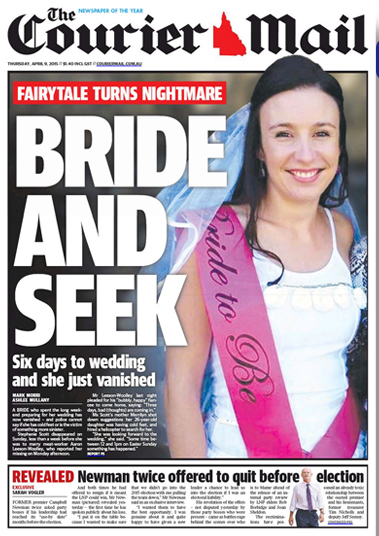Courier-Mail censured for ‘light hearted’ Bride and Seek Stephanie Scott headline
 The ‘light hearted’ nature of the Courier-Mail’s treatment of the disappearance of murdered schoolteacher Stephanie Scott was offensive, the Australian Press Council has ruled.
The ‘light hearted’ nature of the Courier-Mail’s treatment of the disappearance of murdered schoolteacher Stephanie Scott was offensive, the Australian Press Council has ruled.
Its ‘Bride and Seek’ front page headline was positioned next to a large picture of Scott and the accompanying article stating they could not say whether the disappearance was a result of “cold feet” or “something more sinister”, prompted a huge backlash from readers.
The paper came out on April 9, the day police confirmed Scott had been murdered.
In its defence to the Press Council the Courier-Mail argued the headline centred on the focus of the report which was the disappearance of a bride-to-be and a search for her.
It said this was why it had used the word ‘seek’ and noted the article was consistent with other media reports on the disappearance.
The Courier-Mail said that when the article was prepared and printed on the evening of April 8, the official police position was that it was a “missing person case”.
It said the news of the arrest and pending murder charges did not emerge until approximately seven hours after the article was prepared and after distribution of that edition had occurred. It said there had been no intention to make light of a shocking event.
The newspaper said after it became aware the case was a murder investigation it took “swift steps” to remove the cover page from all of its digital platforms and also changed its online coverage.
In its conclusion the Press Council said the paper had elevated the “slender possibility” Scott was a missing person with the headline, adding: “The front page treatment it received, in addition to the lighthearted tenor of the headline, was substantially offensive to many people, and could be expected to have caused distress in particular to those who knew the woman.”
It found the paper had breached General Principle six of the codes of practice which says publications must “avoid causing or contributing materially to substantial offence, distress or prejudice, or a substantial risk to health or safety, unless doing so is sufficiently in the public interest”.
Miranda Ward



 Linkedin
Linkedin
The Daily Mail is one of the most crass and unprofessional newspapers on the face of the globe. It’s a journalistic disgrace – time and time again. From this kind of story to it’s endless propaganda jaw-boning on behalf of the Murdoch-run police and nanny state (see vaccination disinformation scare campaigns as one example), this newspaper is more than a major media issue. It’s a civil liberty issue, as long as it continues to push an increasingly blatant media agenda to program the public through coercion, shame and disinformation pieces.
So how do we end it? Vote with your wallet as the all-powerful consumer. Cancel subscriptions, stand purchases and encourage others to do the same. We look forward to it’s demise, as a population that deserves a better class of news and more credit as a people capable of analytical thought and independent research.
User ID not verified.
@Paul
This article is about The Courier-Mail… a Murdoch paper.
The Daily Mail is not a News Corp / Murdoch paper. And I do agree, it’s pretty much trash.
There will always be audiences turning to local news resources – but those who want trusted and respected news however will turn elsewhere.
User ID not verified.
I love the courier male. 🙂 .
User ID not verified.